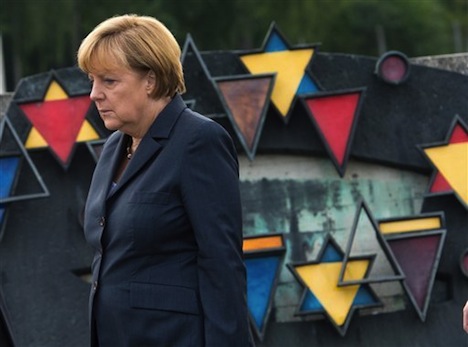In what’s been perhaps the most boring campaign season in German politics since reunification, chancellor Angela Merkel made big headlines yesterday when she became the first acting chancellor to tour the grounds of the former Nazi concentration camp at Dachau.![]()
![]()
Merkel took a somber detour from her campaign to visit the site, where 41,000 mostly Jewish prisoners were slaughtered by the Nazi regime — the concentration camp’s location in the middle of Bavaria, in contrast to even more ghastly extermination camps at Auschwitz and Treblinka in what is today Poland, has always made it a particularly wrenching site in the postwar German memory. Merkel laid a wreath in honor of the victims, and she met with several survivors, including 93-year-old Max Mannheimer, who was imprisoned at the camp at age 24 and today chairs the Dachau camp community association. The visit won plaudits from German Jewish groups, who praised Merkel for pausing her campaign to reflect on the atrocities of what happened seven decades ago at Dachau, not just far to the east but in the southern heartland of Germany.
It is perhaps appropriate that Merkel, the first postwar East German chancellor, was the first active German leader to visit the site. Merkel spent the first 35 years of her life behind the Iron Curtain, first as a physical chemist and increasingly, a pro-democracy activist when the Berlin Wall fell. Though West Germany recovered rapidly after the end of the Nazi era, East Germans suffered through four decades of authoritarian socialist rule under the heel of Soviet Russia. In her brief remarks, Merkel noted that ‘the name Dachau is tragically famous as it serves as a model for the concentration camps,’ adding that ‘the memory of that fate fills me with deep sadness and shame.’
But the headlines are not entirely positive — and some are downright hostile — because Merkel scheduled the visit as an aside from a reelection whistle-stop tour. After visiting Dachau, Merkel was off to visit a beer tent in the nearby town of Dachau and delivered a political speech alongside a Bavarian brass band in traditional costume.
A leader of the opposition Die Grünen (Green Party), Renate Künast, harshly attacked what she called a ‘tasteless and outrageous combination’:
“If you’re serious about commemoration at such a place of horrors, then you don’t pay such a visit during an election campaign,” she told the daily Leipziger Volkszeitung.
But Merkel’s main opponent, Peer Steinbrück, the chancellor candidate of the center-left Sozialdemokratische Partei Deutschlands (SPD, the Social Democratic Party), has not criticized her, and Jewish groups have universally cheered Merkel for her gesture, so it’s unlikely that the visit, or the controversy surrounding it, is likely to cause any lasting political damage. Voters generally understand that incumbents running for reelection have two jobs — chancellor and candidate.
It’s a reminder that, despite Germany’s efforts to come to terms with the Holocaust, it’s not always an easy topic to navigate for German politicians, even 68 years after the end of World War II and even for a politician as skilled as Merkel.
Merkel seems likely to return for a third consecutive term as chancellor after federal elections on September 22, either with her current coalition partners or in some form of ‘grand coalition’ with her chief center-left opposition. She leads the Christlich Demokratische Union (CDU, Christian Democratic Union), which is the dominant center-right party in Germany except in Bavaria, where the CDU’s sister party, the Christlich-Soziale Union in Bayern (CSU, the Christian Social Union) is dominant. The CSU has governed the state of Bavaria since 1946 (save for a short period in the early 1950s) and currently holds 44 seats in the Bundestag, Germany’s parliament. Merkel’s campaign stop was designed not only to boost the CSU in the upcoming federal elections, but also the state election scheduled in Bavaria for September 14.
Although the CDU and the CSU were both founded in 1945, the split goes back to Weimar-era Germany. The Bavarian People’s Party (think of it as a predecessor to the CSU) split from the Centre Party (the predecessor to the CDU) to focus on a more conservative, Bavaria-oriented agenda.
Since 1945, the two parties have worked in union at the federal level as a bloc in the Bundestag, though there have often been tensions between the two in light of the fact that the CSU is more predominantly Catholic, socially conservative on issues like same-sex marriage and even more eurosceptic than its CDU counterpart. Former chancellor Helmut Kohl and former Bavarian minister-president Franz-Joseph Strauß were bitter political foes in the late 1970s and early 1980s; likewise, former Bavarian minister-president Edmund Stoiber often caused headaches for Merkel until Stoiber was forced to step down in 2007.
Photo credit to dpa / Peter Kneffel.
